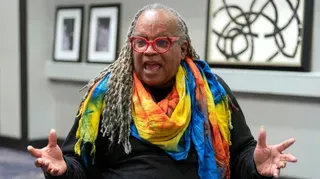April 8, 2011
EU Ministers Wrangle Over Portugal Bailout
Kilian Melloy READ TIME: 3 MIN.
European finance ministers were wrangling over the size and terms of a rescue loan for Portugal at the start of their two-day meeting in Hungary Friday, but said uncertainty over how much the caretaker government in Lisbon can offer in return made an imminent deal unlikely.
Portugal submitted a formal request for help to the European Commission, the EU's executive, Thursday evening, officially kicking off negotiations for a bailout that had been anticipated for months.
Finance Minister Fernando Teixeira dos Santos now has to convince his 16 eurozone counterparts that Lisbon has the authority to implement structural reforms and budget cuts designed to get the country's public finances back into shape.
Teixeira dos Santos, who together will the rest of the government is only acting as a caretaker until elections in June, indicated Friday how difficult it may be to reach at a deal, since opposition parties will have to be involved in negotiations.
"The interlocutor of the European authorities is not only the government but also the major political parties, because we need a commitment of the country, not only a commitment of the government," he said as he arrived in Godollo, a small town just outside Budapest.
The Portuguese government resigned late last month after opposition parties rejected new tax hikes and spending cuts that had been worked out together with the European Commission, the EU's executive, and the European Central Bank.
That package of reforms - also sanctioned by other eurozone governments - will now form the basis of discussions for any bailout program. But Finland's Finance Minister Jyrki Katainen said Friday morning that even those planned reforms may not satisfy demands.
"The package must be harder than the one the parliament voted against," Katainen told journalists. "There must be some structural reforms, only fiscal consolidation is not enough."
Amadeu Altafaj Tardio, the spokesman for the EU's Monetary Affairs Commissioner Olli Rehn, also said that the reforms were only a starting point, and a full program will have to go beyond that.
A stringent economic adjustment program is a key prerequisite for international help - serving as assurance that the bailed-out country will eventually garner the strength to repay its creditors.
Most analysts expect Portugal to need around euro80 billion ($114 billion) to cover its costs over the next three years without having to raise money on debt markets at prohibitive rates.
But ministers said it was too early to put a number on Lisbon's financing needs. "I wait first to hear their needs before I put a check on the table," said French Finance Minister Christine Lagarde.
The Social Democrats, Portugal's main opposition party, have said they would like to have some kind of bridge solution, leaving a full deal until after the elections, but Germany and other financially strong euro countries have so far ruled out giving money without a firm commitment.
There will have to be "one fully fledged program," said Rehn.
Eurozone governments are already locked in a fight with Ireland's newly elected leadership about changing that country's bailout agreement - sealed only in November.
Ireland's Finance Minister Michael Noonan said he wanted to talk to his German and French colleagues about lower interest rates for the country's euro67.5 billion bailout, but added that with Portugal likely to dominate the meeting Friday and Saturday, he did not expect a deal.
Greece, the eurozone's first country to need a rescue last May, had its interest late lowered in March. However Dublin has refused to budge on its super-low corporate tax rate, angering some of the currency union's bigger members who believe the Irish tax regime is stealing business away from them.
Eurozone ministers said they were confident that a rescue for Portugal would finally draw a line under the debt crisis that has crippled the region for more than a year now. Spanish Finance Minister Elena Salgado said it was "completely out of the question" that her country, seen by many as the eurozone's next most vulnerable member, would need international help, too.
"Our economy is much bigger, we have a much more diversified economy, we have a much better track record and we are in the middle of big structural reforms and we have a big and strong commitment to the reducing of our deficit," she said. "We have been successful in that and the future ahead is much better."
Kilian Melloy serves as EDGE Media Network's Associate Arts Editor and Staff Contributor. His professional memberships include the National Lesbian & Gay Journalists Association, the Boston Online Film Critics Association, The Gay and Lesbian Entertainment Critics Association, and the Boston Theater Critics Association's Elliot Norton Awards Committee.







